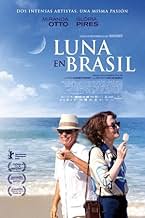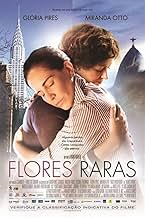IMDb RATING
7.0/10
3.7K
YOUR RATING
A chronicle of the tragic love affair between American poet Elizabeth Bishop and Brazilian architect Lota de Macedo Soares.A chronicle of the tragic love affair between American poet Elizabeth Bishop and Brazilian architect Lota de Macedo Soares.A chronicle of the tragic love affair between American poet Elizabeth Bishop and Brazilian architect Lota de Macedo Soares.
- Awards
- 9 wins & 21 nominations total
Featured reviews
Reaching for the Moon is the kind of movie everyone hopes for but no one makes: a gay romance where "gay romance" is not the premise. Director Bruno Barreto focuses instead on how Elizabeth Bishop and Lota de Macedo Soares challenged and changed the world and each other in other ways, and that was absolutely the right choice - these women and their story are fascinating and make for top class entertainment.
And it is entertaining. Considering the characters' issues and the story's ending it could have been drab, but the film is always lively and engaging. It flies by. Bishop takes herself very seriously, but Barreto maintains a sense of humor about it and makes fun of her just enough to keep her melodrama under control. An added bonus is that Miranda Otto gets to show off her underrated and underused comedic chops; one particular drunk scene is priceless. Glória Pires is dynamic and fiery as Lota but Otto is the real star, channeling Greta Garbo and Deborah Kerr in a gracefully commanding performance. She doesn't shy away from Bishop's spikiness, but her screen presence is so compelling that as much as we might be frustrated with her character, we can't take our eyes off her. Thanks to her constantly surprising performance, an eclectic ensemble cast, breathtaking visuals, and assured direction, Reaching for the Moon pulses with energy and is a breath of fresh air in an era of stuffy and bland biopics.
Highlights: Shots of Rio de Janeiro that belong on postcards; a performance from Miranda Otto that would have won an Oscar in 1937; the assertion that some things are more important than whether a person is gay
Verdict: Watch this with your parents instead of Blue Is the Warmest Color
And it is entertaining. Considering the characters' issues and the story's ending it could have been drab, but the film is always lively and engaging. It flies by. Bishop takes herself very seriously, but Barreto maintains a sense of humor about it and makes fun of her just enough to keep her melodrama under control. An added bonus is that Miranda Otto gets to show off her underrated and underused comedic chops; one particular drunk scene is priceless. Glória Pires is dynamic and fiery as Lota but Otto is the real star, channeling Greta Garbo and Deborah Kerr in a gracefully commanding performance. She doesn't shy away from Bishop's spikiness, but her screen presence is so compelling that as much as we might be frustrated with her character, we can't take our eyes off her. Thanks to her constantly surprising performance, an eclectic ensemble cast, breathtaking visuals, and assured direction, Reaching for the Moon pulses with energy and is a breath of fresh air in an era of stuffy and bland biopics.
Highlights: Shots of Rio de Janeiro that belong on postcards; a performance from Miranda Otto that would have won an Oscar in 1937; the assertion that some things are more important than whether a person is gay
Verdict: Watch this with your parents instead of Blue Is the Warmest Color
I was sad to see this deeply moving, complex and intelligent story of the love between the award winning American poet Elizabeth Bishop and Brazilian architect Lota de Macedo Soares. so overlooked by U.S, audiences and critics. There are two outstanding performances by Miranda Otto as the outwardly shy and repressed alcoholic Bishop, and Gloria Pires as her opposite, an extroverted, highly emotional woman who coaxes Bishop out of her shell.
Very nicely photographed, this reminded me of the best of the Merchant-Ivory films. It's not flashy. Indeed there's a quiet to it that is needed to off-set the melodramatic (even if based in truths) elements of these women's lives. But that doesn't keep it from packing a hell of an emotional punch, and in being bold enough to create characters we care for, but who are also deeply troubled and capable of making bad choices – just like in the real world of relationships we rarely see on screen. It was also nice to see a gay-themed love story that both acknowledged how difficult being homosexual was in the 1950s, while not becoming a film about that only. This is a film about a complex relationship between two highly creative and wounded souls who both save and damage each other. The fact that both are women is only a small part of the larger story. It's also one of the only films I've seen capture at least a taste of the struggle and loneliness of the act of writing.
One of those little gems that deserves to be discovered by more people.
Very nicely photographed, this reminded me of the best of the Merchant-Ivory films. It's not flashy. Indeed there's a quiet to it that is needed to off-set the melodramatic (even if based in truths) elements of these women's lives. But that doesn't keep it from packing a hell of an emotional punch, and in being bold enough to create characters we care for, but who are also deeply troubled and capable of making bad choices – just like in the real world of relationships we rarely see on screen. It was also nice to see a gay-themed love story that both acknowledged how difficult being homosexual was in the 1950s, while not becoming a film about that only. This is a film about a complex relationship between two highly creative and wounded souls who both save and damage each other. The fact that both are women is only a small part of the larger story. It's also one of the only films I've seen capture at least a taste of the struggle and loneliness of the act of writing.
One of those little gems that deserves to be discovered by more people.
I enjoyed this story of a lengthy midlife love affair, "based on" (that is, "not cemented to the known facts of") real women of some mid-century renown. One, American poet Elizabeth Bishop, is quiet, slow to warm to strangers or share working drafts of her poems. See if Miranda Otto doesn't remind you of Deborah Kerr in her memorable 1940s and '50s roles (and clothes). In Brazil to visit an old college friend, Elizabeth meets Lota de Macedo Soares, a charismatic commander of attention and glamorously trousered architect. They become lovers and make their life in Brazil. All the characters, including a close male friend of Lota's and one of Elizabeth's, are revelations in the best sense: mature but unfinished adults, they meet their circumstances over nearly 20 years in ways not even they might be able to predict. Mark Twain said that fiction is obliged to meet our expectations but the truth isn't. Central Casting can provide "types," but history offers people like nobody else, which is why you'll find discussions here and elsewhere complaining that these lesbians were not put through their proper lesbian plot paces! The drunks were sometimes sober! People got depressed without enough foreshadowing! Ignore all that. This is a good quiet story, mostly but not all sad, about people learning themselves as they go, living genuinely if not always bravely.
And anyone who's ever dreamed of having a writer's sanctuary will fall rapturously in love with the al fresco study Lota builds for Elizabeth. Must be seen to be appreciated!
And anyone who's ever dreamed of having a writer's sanctuary will fall rapturously in love with the al fresco study Lota builds for Elizabeth. Must be seen to be appreciated!
Lovely. A story here that is not overshadowed by the relationships, politics, or agenda. It is, simply beautifully filmed, the beaches of Rio De Janeiro, the beautiful home Lota has deigned in part to accommodate her new lover, poet Elizabeth Bishop, completely played by Miranda Otto.
Otto is at once restrained yet yearning, a Vassar graduate visiting her friend, who initially is puzzled (and indeed overwhelmed) by the beauty and passion of South America.
She plays the American New England spinster type well, without a stereotype here. We can feel she wants, and NEEDS to break free from societal restraints.
The filming of the rain forests, the owls at night, the visuals are incredible. Lota Soares was politically connected and designed the park near Carioca beach, the title infers, reaching for the moon has so may more connotations for each woman.
What is most refreshing is the way this film is written, sensitive to the issues each woman experiences, it is an individual and a private journey.
The actress portraying Carlotta Soares is affecting and sad, and Miranda Otto is quite believable as Bishop. The story is beautiful and sad, and the scenery of Brazil is not to be missed, simply beautiful, and beautifully filmed. 10/10
Otto is at once restrained yet yearning, a Vassar graduate visiting her friend, who initially is puzzled (and indeed overwhelmed) by the beauty and passion of South America.
She plays the American New England spinster type well, without a stereotype here. We can feel she wants, and NEEDS to break free from societal restraints.
The filming of the rain forests, the owls at night, the visuals are incredible. Lota Soares was politically connected and designed the park near Carioca beach, the title infers, reaching for the moon has so may more connotations for each woman.
What is most refreshing is the way this film is written, sensitive to the issues each woman experiences, it is an individual and a private journey.
The actress portraying Carlotta Soares is affecting and sad, and Miranda Otto is quite believable as Bishop. The story is beautiful and sad, and the scenery of Brazil is not to be missed, simply beautiful, and beautifully filmed. 10/10
Overall had a very good impression of the movie. I think it balanced well certain aspects... especially in the portrayal of their romance. They avoided being overly prudish and that made the romance seem more real. Without getting too kinky and losing focus. The contrast between the two characters is really interesting.
The actress Gloria Pires who portrays Lota de Macedo Soares has worked in dozens of soap operas and that sometimes comes through in her films, but not this time thankfully. She so embodies the force of nature that was Lota and this comes through the screen very well. I felt like I was seeing a member of my old Rio family... so her amazing portrayal was certainly the highlight of the film for me.
PS: Being a Macedo Soares myself (but too young to have known Lota)... there might be a bit of bias in my review.
The actress Gloria Pires who portrays Lota de Macedo Soares has worked in dozens of soap operas and that sometimes comes through in her films, but not this time thankfully. She so embodies the force of nature that was Lota and this comes through the screen very well. I felt like I was seeing a member of my old Rio family... so her amazing portrayal was certainly the highlight of the film for me.
PS: Being a Macedo Soares myself (but too young to have known Lota)... there might be a bit of bias in my review.
Did you know
- TriviaFour paragraphs appear between the end of the film and the beginning of the credits.
1. "Few women write major poetry. Only four stand with our best men: Emily Dickinson, Marianne Moore, Elizabeth Bishop and Sylvia Plath." - Robert Lowell
2. "I'd rather be called the 'The 16th Poet' with no reference to my sex, than one of 4 women - even if the other three are pretty good." - Elizabeth Bishop
3. Elizabeth Bishop died in 1979 in the United States. She is considered on the most important poets of the English language.
4. In 2012, UNESCO declared the city of Rio De Janeiro a World Heritage site. The Flamengo Park is one of its main attractions.
- GoofsOpening in 1951 but Bobby Vinton singing Blue Velvet was not until 1963.
- Quotes
Elizabeth Bishop: It's OK. I'm not drunk. I'm just crying in English.
- Crazy creditsNine of the main performers (the first 10) are listed in the credits without the name of their character. Only Treat Williams is credited as his character, Robert Lowell.
- ConnectionsReferenced in Programa do Jô: Episode dated 26 August 2013 (2013)
- How long is Reaching for the Moon?Powered by Alexa
Details
- Release date
- Country of origin
- Official sites
- Languages
- Also known as
- Fleurs rares
- Filming locations
- Production companies
- See more company credits at IMDbPro
Box office
- Gross US & Canada
- $45,502
- Opening weekend US & Canada
- $14,573
- Nov 10, 2013
- Gross worldwide
- $1,534,391
- Runtime1 hour 58 minutes
- Color
- Aspect ratio
- 1.85 : 1
Contribute to this page
Suggest an edit or add missing content















